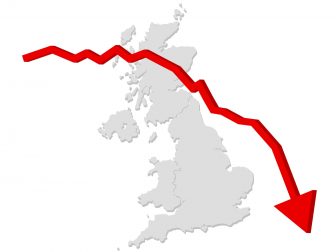 UK house prices fell last month for the first time in more than a year as the market chaos sparked by the government’s “mini” Budget drove up borrowing costs and hit household finances.
UK house prices fell last month for the first time in more than a year as the market chaos sparked by the government’s “mini” Budget drove up borrowing costs and hit household finances.
Nationwide yesterday said that residential property prices fell 0.9% between September and October – the first month-on-month drop since July 2021 when a cut to stamp duty was being phased out, and the greatest decline since June 2020 at the height of the coronavirus pandemic.
Annual growth in house prices slowed from 9.5% to 7.2%.
According to Robert Gardner, Nationwide’s chief economist, a typical first-time buyer with a 20% deposit would now face monthly mortgage payments worth 45% of their take-home pay, based on an average mortgage rate of 5.5%, which is a similar ratio to the one seen before the 2008 financial crisis.
Industry reaction:
Iain McKenzie, CEO of The Guild of Property Professionals, said: “The good ship United Kingdom has been steered back to calmer waters after being battered by a stormy October.
“The steps taken by the new prime minister and chancellor are reassuring, but it will take time for their steady hand on the tiller to calm home buyers.
“Higher mortgage rates will impact some house sales, but demand remains high in many areas, and lack of supply is likely to cushion prices from major corrections.
“Now that the chaos of the mini-budget has passed, many buyers will be looking again at their options, and seeing that the situation is more positive than they had thought.”
Samuel Tombs, economist at the consultancy Pantheon Macroeconomics, said the figures gave “the strongest signal yet that house prices will buckle”, as pressure on household incomes intensify.
Nathan Emerson, chief executive of Propertymark, said: “Agents are reporting more homes for sale coming to the market, giving buyers more choice than they have had over the past two years. They no longer have a fear of losing out on a property and can therefore be more level headed with the offers they’re putting forward, which will naturally see a softening in prices being achieved over the next few months.”
Matthew Thompson, head of Sales at Chestertons, commented: “October’s property market was very much dictated by the avalanche effect of September’s Mini-Budget announcement. Buyers were facing the reality of higher interest rates and mortgage providers withdrawing a number of products, which created a new sense of urgency. This has led to house hunters rushing to finalise their purchase, resulting in a 53% increase in the number of exchanges compared to October last year.”
“Despite economic uncertainty, buyer demand seemed undeterred as our branches registered the same volume of enquiries as in October 2021. This shows yet again that, compared to the national picture, London’s property market has its very own rhythm and remains a key destination for buyers and investors alike.”
Director of Benham and Reeves, Marc von Grundherr, commented: “Any market slowdown is likely to strike fear into the hearts of the nation’s homeowners, but a reduction in the rate of house price growth should be largely welcomed.
The monumental levels of house price appreciation seen throughout the pandemic market boom just simply aren’t sustainable and it’s far better the market steadily returns to normality, rather than crashing back down to earth with a bump.
James Forrester, MD of Barrows and Forrester, remarked: “Despite the panic of recent weeks, we’re simply seeing no let up from buyers on the ground and there remains a far greater appetite for homeownership than the available housing stock to satisfy it.
While this remains the case, any fears of a property market crash can be firmly put to bed and we expect to see house prices continue to increase on an annual basis throughout the remainder of the year, albeit at a more measured pace, as has already been the case in recent months.”
Managing Director of HBB Solutions, Chris Hodgkinson, said: “All current signs point to a housing market running dangerously low on steam, with buyer demand starting to fade, while dangerously over-inflated house prices can no longer maintain the trajectory of the last two years.
With many buyers also being hit by increasing mortgage costs, we can expect a turbulent few months ahead, as sellers struggle to achieve their desired asking price, leading to a raft of sales falling through.”


Comments are closed.